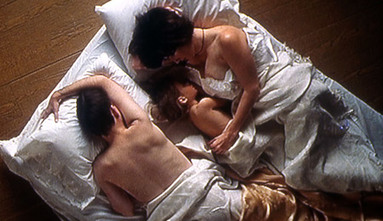
The Sweet Hereafter opens on a painterly image of perfect familial bliss. A husband and wife are sleeping in a sunlit room with their young daughter in between them. There’s nothing in the room except the mattress and the covers on a hardwood floor, giving the impression that for this family, nothing else in the universe exists outside of this moment. That Atom Egoyan opens his film in this fashion is a cruel juxtaposition to what it’s actually about. The Sweet Hereafter depicts a near-unimaginable, though well-constructed, scenario of grief and loss.
The Sweet Hereafter tells a fractured narrative revolving around a bus crash that killed almost all of a small Canadian town’s children. Mitchell Stephens, the husband in the opening tableau, is a tort lawyer attempting to craft a class-action lawsuit around the crash. Played by Ian Holm, Stephens is mostly successful, enlisting the bus driver and several grieving families. Those families are introduced in flashbacks intact and happy, from single dad Billy Ansel (Bruce Greenwood) and his twins, to a hippie family raising an adopted, universally beloved, Native Canadian boy named Bear. When not assembling plaintiffs, Stephens is wrestling with how to deal with his drug-addicted daughter Zoe (Caerthan Banks), currently in the midst of yet another relapse. All subplots are infected with loss and longing, as happy memories are twisted and tainted in the face of a bleak reality.
Stephens gets the most screentime, and ably holds down the center of the film. In meetings with families, he repeatedly has to make the case for monetary justice. Someone has to pay, just not the school corporation because they have low insurance payouts. Egoyan squeezes some much-needed black comedy out of Stephens’s tactics. In trying to recruit Bear’s parents, the floor plan and lack of furniture means that he has to approach them literally on his knees, and when he ends his speech by saying they should talk it over privately while he gets something out of his car, Egoyan cuts to Stephens running through the snow. There is no question that he is being mercenary, and The Sweet Hereafter certainly is not some paean to trial lawyers a la Erin Brockovich. While he’s fairly despicable in dealing with the townsfolk, the inclusion of his tortuously complicated relationship with his daughter humanizes Stephens. Though he doesn’t share his circumstances with the townsfolk, it’s readily apparent that he fears for himself what has happened to them.
It’s in those family scenes that Egoyan hits hardest. He fills the background with details that demonstrate the gravity of what these parents have been dealing with. Bear’s parents, previously welcoming and joyful, are now hopelessly, irrevocably depressed and deflated. Another family still hasn’t replaced the calendar from the month of the accident, and the bus driver, played with a rural hospitality and sense of humor by Gabrielle Rose, has a wall covered in pictures of ‘her’ kids. Items are infused with meaning, positive and negative, as parents become desperate for meaning and the answers that Stephens insists are out there. Some are angry, some are faking normalcy, some are resigned to misery. Egoyan honestly covers the spectrum of possible responses.
Despite its successful rations of black humor, The Sweet Hereafter nudges unwatchable territory due to its subject matter. Children of Men, another film about the absence of kids, has the benefit of distance, as they haven’t been killed, but instead don’t exist in recent memory. The two share an air of hopelessness pervades it, but Sweet Hereafter wallows in it. Another personal favorite, the very similar Rabbit Hole, is more intimate, and arrives at a more profound conclusion. In juggling all its characters, Egoyan’s film has some missteps, particularly a melodramatic subplot involving Sarah Polley’s dark home life. The Sweet Hereafter is a valuable entry to the dead-kids genre, and one that avoids sap and manipulation, even as it doesn’t reach the top of the miserable heap. B
 RSS Feed
RSS Feed